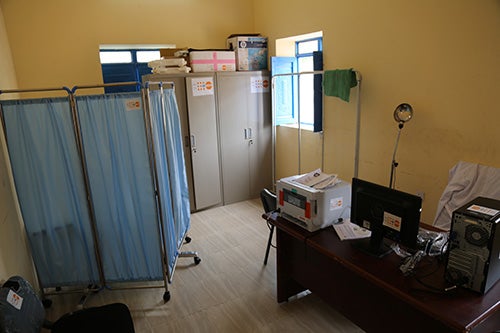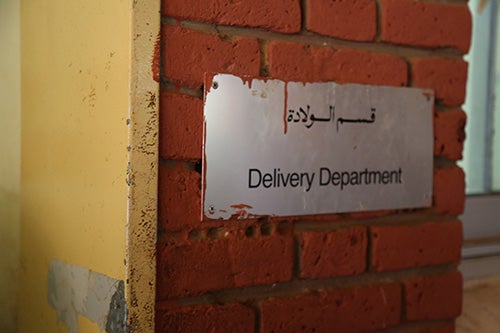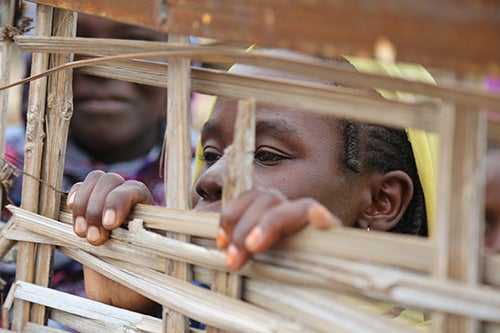News
Pregnant women, survivors of violence at risk in West Darfur clashes
- 05 February 2020
News
KHARTOUM/EL GENEINA, Sudan – Deadly clashes in West Darfur have uprooted tens of thousands of people from their homes. Reliable sources indicate that widespread gender-based violence is taking place, including alleged gang rapes, physical assault, harassment and sexual humiliation. Among those displaced are thousands of pregnant women requiring urgent access to maternal health care, including safe delivery services.
“I was really afraid because I left my village and I am nine months pregnant,” Housnyya told UNFPA earlier this week. “When I reached the shelter, I was really worried because they told me that the hospital is far away from us. I have 1-year-old twins, and they will be alone without anyone to take care of them.”

UNFPA is working with the Government and partners to provide life-saving services women and girls of reproductive age, including pregnant women and survivors of violence.
Since inter-communal violence erupted in the state capital, El Geneina, in December, some 11,000 people have been driven across the border into Chad, and some 46,000 people have been displaced within the country, according to recent reports from the United Nations Refugee Agency (UNHCR). Many are living in the open or in makeshift shelters.
There are serious concerns about security in the displacement camps, a UNFPA Flash Update notes.
Tragically, survivors of gender-based violence are largely going without medical and psychosocial services due to prevailing stigmas that penalize victims of assault and harassment. West Darfur appears to have the region’s worst rate of treatment and service uptake among survivors.
The State Ministry of Health and Social Development and its Combat Violence Against Women unit have deployed social workers to raise awareness of the services available to survivors, and to provide care.
UNFPA is supporting these efforts by distributing thousands of dignity kits, which contain hygiene supplies such as sanitary napkins and soaps, as well as information about how survivors of violence can find and receive medical and psychosocial care. UNFPA has also helped to establish a “confidential corner” at the Geneina Hospital, where survivors can come forward for counselling, treatment and other support.
UNFPA has additionally deployed a gender expert to help the humanitarian response meet the specific needs of violence survivors.

At the onset of the crisis, there were no dedicated clinics for reproductive health. UNFPA has been working with the Sudanese Red Crescent Society and the Government to create sexual and reproductive health clinics to meet the needs of some 3,400 pregnant women and 10,000 women of reproductive age.
“We used to go to the shelters and check in each room for pregnant women to give them services,” Sarah, a midwife, explained to UNFPA in a recent interview.
Today, more than 20 temporary reproductive health clinics have been created to serve 31 different sites where displaced populations are gathering. Reproductive health supplies, including the equipment to manage obstetric complications and perform Caesarean section deliveries and blood transfusions, have been distributed.

“Now, because we have a tent clinic inside the shelter, pregnant women have started to arrive to ask for services as they know of our presence,” Sarah said.
She added that she and her colleagues are also distributing clean delivery kits – which contains sterile birthing supplies such as gloves, a blade, a clean blanket, and a clean plastic sheet – in case women are unable to reach delivery care when they go into labour. “The delivery kit that we provide, as well as of the medicine and the counselling, help the women here a lot,” she said.
These services are a source of comfort to women like Sayda Ismail, who is nine months pregnant. “I was following up with midwives at the health centre before the displacement,” she explained. “After the displacement, I was afraid because I thought I would be without any health care, as I have almost reached my delivery. But the presence of the tent clinic and midwives inside, who gave me a clean delivery kit and medicines, relieved me.”
Housnyya, too, says she was glad to learn that these services were available close to her family’s shelter. “I found the tent clinic, which provides births and reproductive health services. I can rest assured that my babies and I will be in a safe hands.”